绝美的中英文翻译(美了,我的中文!)论述.ppt
- 格式:ppt
- 大小:115.50 KB
- 文档页数:8
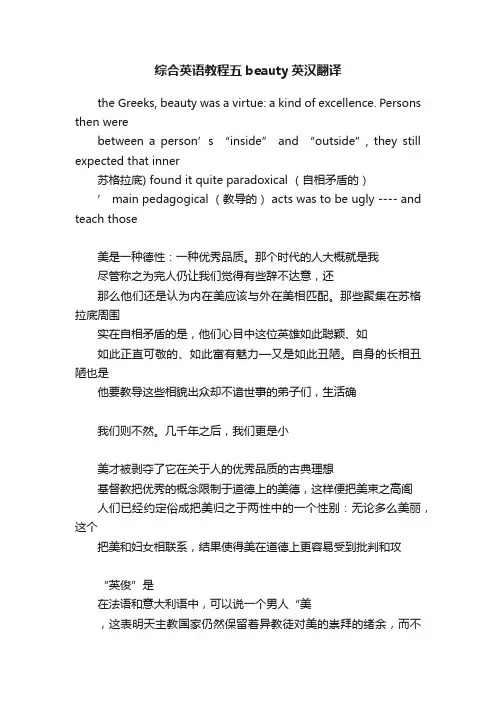
综合英语教程五beauty英汉翻译the Greeks, beauty was a virtue: a kind of excellence. Persons then werebetween a person’s “inside” and “outside”, they still expected that inner苏格拉底) found it quite paradoxical (自相矛盾的)’ main pedagogical (教导的) acts was to be ugly ---- and teach those美是一种德性:一种优秀品质。
那个时代的人大概就是我尽管称之为完人仍让我们觉得有些辞不达意,还那么他们还是认为内在美应该与外在美相匹配。
那些聚集在苏格拉底周围实在自相矛盾的是,他们心目中这位英雄如此聪颖、如如此正直可敬的、如此富有魅力—又是如此丑陋。
自身的长相丑陋也是他要教导这些相貌出众却不谙世事的弟子们,生活确我们则不然。
几千年之后,我们更是小美才被剥夺了它在关于人的优秀品质的古典理想基督教把优秀的概念限制于道德上的美德,这样便把美束之高阁人们已经约定俗成把美归之于两性中的一个性别:无论多么美丽,这个把美和妇女相联系,结果使得美在道德上更容易受到批判和攻“英俊”是在法语和意大利语中,可以说一个男人“美,这表明天主教国家仍然保留着异教徒对美的崇拜的绪余,而不同于演化为不论是基督教国家还是基督教衰落后的国家,妇女都是美的(这)不必经历便能认识到,教会妇女把自己和美联系起来,这就,即整个社会,都已经把身为女性与关心自己的相貌等同视(这和具有男子气概正好相反,人们把具有男子气概与关心自己的身份和作)由于存在这些老一多数妇女所接受的女性的理想化的形象使得她们对于真实的自我产生了不必美之理想是以一种自我压抑的形式而施加于人的。
妇女学会分开来看往往是绝望的端量。
即使某些部一表人才在于整体,是一眼看出的。
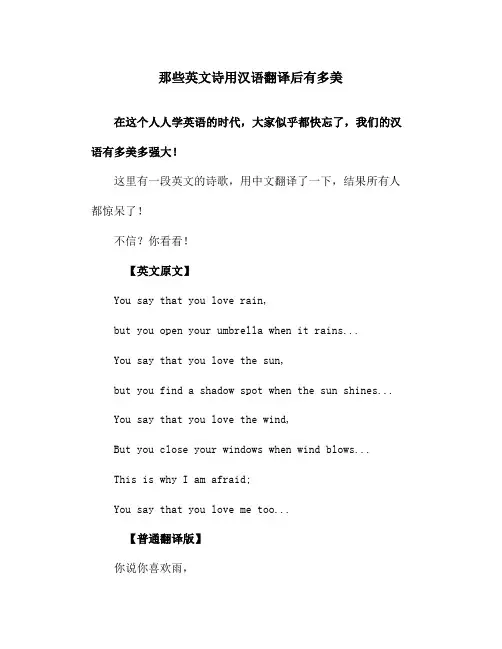
那些英文诗用汉语翻译后有多美在这个人人学英语的时代,大家似乎都快忘了,我们的汉语有多美多强大!这里有一段英文的诗歌,用中文翻译了一下,结果所有人都惊呆了!不信?你看看!【英文原文】You say that you love rain,but you open your umbrella when it rains...You say that you love the sun,but you find a shadow spot when the sun shines...You say that you love the wind,But you close your windows when wind blows...This is why I am afraid;You say that you love me too...【普通翻译版】你说你喜欢雨,但是下雨的时候你却撑开了伞;你说你喜欢阳光,但当阳光播撒的时候,你却躲在阴凉之地;你说你喜欢风,但清风扑面的时候,你却关上了窗户。
我害怕你对我也是如此之爱。
【文艺版】你说烟雨微芒,兰亭远望;后来轻揽婆娑,深遮霓裳。
你说春光烂漫,绿袖红香;后来内掩西楼,静立卿旁。
你说软风轻拂,醉卧思量;后来紧掩门窗,漫帐成殇。
你说情丝柔肠,如何相忘;我却眼波微转,兀自成霜。
子言慕雨,启伞避之。
子言好阳,寻荫拒之。
子言喜风,阖户离之。
子言偕老,吾所畏之。
【离骚版】君乐雨兮启伞枝,君乐昼兮林蔽日,君乐风兮栏帐起,君乐吾兮吾心噬。
【五言诗版】恋雨偏打伞,爱阳却遮凉。
风来掩窗扉,叶公惊龙王。
片言只语短,相思缱倦长。
郎君说爱我,不敢细思量。
【七言绝句版】微茫烟雨伞轻移,喜日偏来树底栖。
一任风吹窗紧掩,付君心事总犹疑。
江南三月雨微茫,罗伞轻撑细细香。
日送微醺如梦寐,身依浓翠趁荫凉。
忽闻风籁传朱阁,轻蹙蛾眉锁碧窗。
一片相思君莫解,锦池只恐散鸳鸯。
中华文化积淀了五千年的韵味,跃然而出,实在是太美了!只此一首或许还无法满足你,那么再看看下面这首:【英文原版】If I could save time in a bottlethe first thing that I'd like to dois to save every day until eternity passes awayjust to spend them with youIf I could make days last foreverif words could make wishes come trueI'd save every day like a treasure and thenagain I would spend them with you【普通翻译版】如果我能把时间存入一个瓶子,我要做的第一件事就是:把每一天都存下来直到永恒,再和你一起慢慢度过。
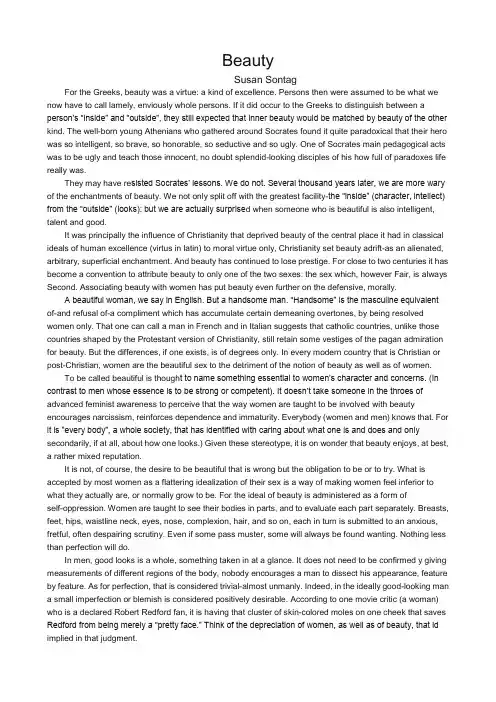
BeautySusan SontagFor the Greeks, beauty was a virtue: a kind of excellence. Persons then were assumed to be what we now have to call lamely, enviously whole persons. If it did occur to the Greeks to distinguish between a person’s “inside” and “outside”, they still expected that inner beauty would be matched by beauty of the other kind. The well-born young Athenians who gathered around Socrates found it quite paradoxical that their hero was so intelligent, so brave, so honorable, so seductive and so ugly. One of Socrates main pedagogical acts was to be ugly and teach those innocent, no doubt splendid-looking disciples of his how full of paradoxes life really was.They may have re sisted Socrates’ lessons. We do not. Several thousand years later, we are more wary of the enchantments of beauty. We not only split off with the greatest facility-the “inside” (character, intellect) from the “outside” (looks): but we are actually surprise d when someone who is beautiful is also intelligent, talent and good.It was principally the influence of Christianity that deprived beauty of the central place it had in classical ideals of human excellence (virtus in latin) to moral virtue only, Christianity set beauty adrift-as an alienated, arbitrary, superficial enchantment. And beauty has continued to lose prestige. For close to two centuries it has become a convention to attribute beauty to only one of the two sexes: the sex which, however Fair, is always Second. Associating beauty with women has put beauty even further on the defensive, morally.A beautiful woman, we say in English. But a handsome man. “Handsome” is the masculine equivalentof-and refusal of-a compliment which has accumulate certain demeaning overtones, by being resolved women only. That one can call a man in French and in Italian suggests that catholic countries, unlike those countries shaped by the Protestant version of Christianity, still retain some vestiges of the pagan admiration for beauty. But the differences, if one exists, is of degrees only. In every modern country that is Christian or post-Christian, women are the beautiful sex to the detriment of the notion of beauty as well as of women.To be called beautiful is though t to name something essential to women’s character and concerns. (In contrast to men whose essence is to be strong or competent). It doesn’t take someone in the throes of advanced feminist awareness to perceive that the way women are taught to be involved with beauty encourages narcissism, reinforces dependence and immaturity. Everybody (women and men) knows that. For it is ”every body”, a whole society, that has identified with caring about what one is and does and only secondarily, if at all, about how one looks.) Given these stereotype, it is on wonder that beauty enjoys, at best, a rather mixed reputation.It is not, of course, the desire to be beautiful that is wrong but the obligation to be or to try. What is accepted by most women as a flattering idealization of their sex is a way of making women feel inferior to what they actually are, or normally grow to be. For the ideal of beauty is administered as a form ofself-oppression. Women are taught to see their bodies in parts, and to evaluate each part separately. Breasts, feet, hips, waistline neck, eyes, nose, complexion, hair, and so on, each in turn is submitted to an anxious, fretful, often despairing scrutiny. Even if some pass muster, some will always be found wanting. Nothing less than perfection will do.In men, good looks is a whole, something taken in at a glance. It does not need to be confirmed y giving measurements of different regions of the body, nobody encourages a man to dissect his appearance, feature by feature. As for perfection, that is considered trivial-almost unmanly. Indeed, in the ideally good-looking man a small imperfection or blemish is considered positively desirable. According to one movie critic (a woman) who is a declared Robert Redford fan, it is having that cluster of skin-colored moles on one cheek that saves Redford from being merely a “pretty face.” Think of the depreciation of women, as well as of beauty, that id implied in that judgment.“The privileges of beauty are immense.” said Cocteau. To be sure, beauty is a form of power. And deservedly so. What is lamentable is that it is the only form of power that most women are encouraged to seek. This power is always conceived relation to men; it is not the power to do that but the power to attract. It is a power that negates itself. For this power is not one that can be chosen freely, at least, not by women, or renounced without social censure.To preen, for a woman, can never be jut a pleasure. It is also a duty. It is her work. If a woman dose real work, and even if she has clambered up to a leading position in politics, law, medicine, business, or whatever, she is always under pressure to a confess that she still works at bring attractive. But in so far as she is keeping up as one of the Fair Sex, she brings under suspicion her very capacity to be objective, professional, authoritative, thoughtful. Damned if they do-women are. And damned if they don’t.One could hardly ask for more important evidence of the dangers of considering persons as split between what is “inside” and what is “outside” than that interminable half-comic half-tragic tale, the oppression of women. How easy it is to start off by defining women as caretakers of their surfaces, and then to disparage them (or find them adorable) for being “superficial”. It is a crude trap, and it has worked for too long. But to get out of the trap requires that women get some critical distance from the excellence and privilege which is beauty, enough distance to see how much beauty itself has been abridged in order to prop up the mythology of the “feminine”. There should be a way of saving beauty from women, and for them.对于古希腊人来说,美丽是一种美德:一种出色表现。

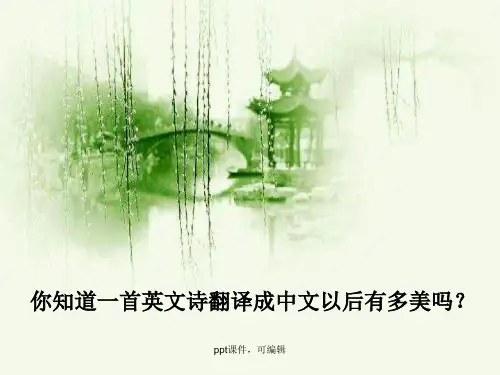
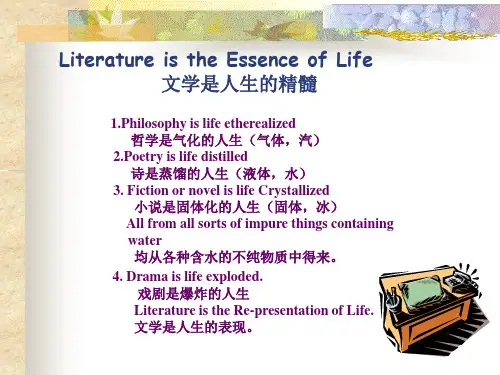
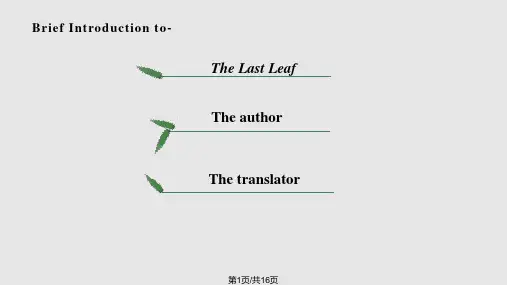
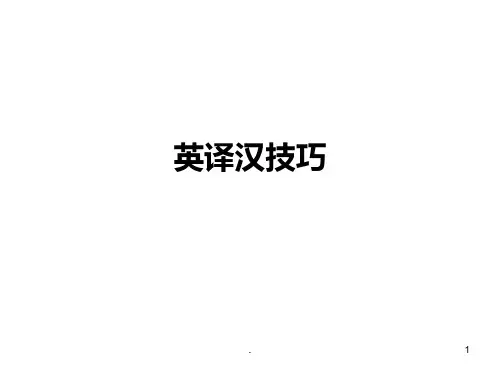
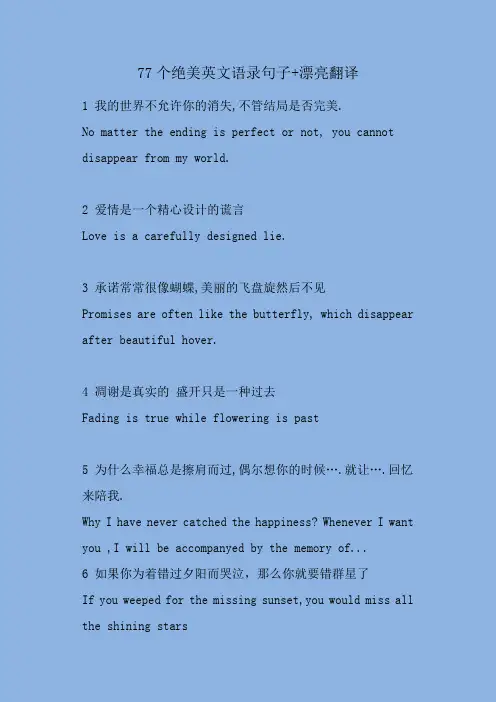
77个绝美英文语录句子+漂亮翻译1 我的世界不允许你的消失,不管结局是否完美.No matter the ending is perfect or not, you cannot disappear from my world.2 爱情是一个精心设计的谎言Love is a carefully designed lie.3 承诺常常很像蝴蝶,美丽的飞盘旋然后不见Promises are often like the butterfly, which disappear after beautiful hover.4 凋谢是真实的盛开只是一种过去Fading is true while flowering is past5 为什么幸福总是擦肩而过,偶尔想你的时候….就让….回忆来陪我.Why I have never catched the happiness? Whenever I want you ,I will be accompanyed by the memory of...6 如果你为着错过夕阳而哭泣,那么你就要错群星了If you weeped for the missing sunset,you would miss all the shining stars7 如果只是遇见,不能停留,不如不遇见If we can only encounter each other rather than stay with each other,then I wish we had never encountered .8 宁愿笑著流泪,也不哭著说后悔心碎了,还需再补吗?I would like weeping with the smile rather than repenting with the cry,when my heart is broken ,is it needed to fix?9 天空没有翅膀的痕迹,而鸟儿已飞过There are no trails of the wings in the sky, while the birds has flied away.10 当香烟爱上火柴时,就注定受到伤害When a cigarette falls in love with a match,it is destined to be hurt11 人活着总是要得罪一些人的就要看那些人是否值得得罪When alive ,we may probably offend some people.However, we must think about whether they are deserved offended.12 命里有时终需有命里无时莫强求You will have it if it belongs to you,whereas you don'tkveth for it if it doesn't appear in your life.13 没有谁对不起谁,只有谁不懂得珍惜谁.No one indebted for others,while many people don't know how to cherish others.14 永远不是一种距离,而是一种决定。
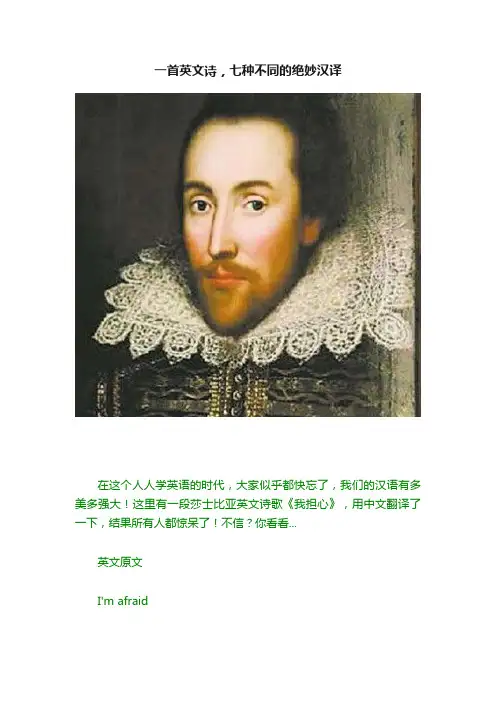
一首英文诗,七种不同的绝妙汉译在这个人人学英语的时代,大家似乎都快忘了,我们的汉语有多美多强大!这里有一段莎士比亚英文诗歌《我担心》,用中文翻译了一下,结果所有人都惊呆了!不信?你看看...英文原文I'm afraidYou say that you love rain,but you open your umbrella when it rains...You say that you love the sun,but you find a shadow spot when the sun shines... You say that you love the wind,But you close your windows when wind blows... This is why I am afraid;You say that you love me too...普通翻译版你说你喜欢雨,但是下雨的时候你却撑开了伞;你说你喜欢阳光,但当阳光播撒的时候,你却躲在阴凉之地;你说你喜欢风,但清风扑面的时候,你却关上了窗户。
我害怕你对我也是如此之爱。
文艺版你说烟雨微芒,兰亭远望;后来轻揽婆娑,深遮霓裳。
你说春光烂漫,绿袖红香;后来内掩西楼,静立卿旁。
你说软风轻拂,醉卧思量;后来紧掩门窗,漫帐成殇。
你说情丝柔肠,如何相忘;我却眼波微转,兀自成霜。
诗经版子言慕雨,启伞避之。
子言好阳,寻荫拒之。
子言喜风,阖户离之。
子言偕老,吾所畏之。
离骚版君乐雨兮启伞枝,君乐昼兮林蔽日。
君乐风兮栏帐起,君乐吾兮吾心噬。
五言诗版恋雨偏打伞,爱阳却遮凉。
风来掩窗扉,叶公惊龙王。
片言只语短,相思缱倦长。
郎君说爱我,不敢细思量。
七言绝句版微茫烟雨伞轻移,喜日偏来树底栖。
一任风吹窗紧掩,付君心事总犹疑。
七律压轴版江南三月雨微茫,罗伞轻撑细细香。
日送微醺如梦寐,身依浓翠趁荫凉。
忽闻风籁传朱阁,轻蹙蛾眉锁碧窗。
一片相思君莫解,锦池只恐散鸳鸯。

绝美爱情感人语句(附英文翻译)1.希望和信任是蜥蜴的尾巴,即使被切断,但它们还会再长出来。
1.Hope and trust is the tailer of a lizard, which can reproduce even afterbeing cut off.2.宁可失败在你喜欢的事情上,也不要成功在你所憎恶的事情上。
2.To lost in something you love is better than to win in something youhate.3.一个人总要走陌生的路,看陌生的风景,听陌生的歌,然后在某个不经意的瞬间,你会发现,原本是费尽心机想要忘记的事情真的就那么忘记了。
3.Oneis always on a strange road, watching strange scenery and listeningtostrange music. Then one day, you will find that the things you tryhardto forget are already gone.4.幸福,不是长生不老,不是大鱼大肉,不是权倾朝野。
幸福是每一个微小的生活愿望达成。
当你想吃的时候有得吃,想被爱的时候有人来爱你。
4.Happinessis not about being immortal nor having food or rights in one'shand.It's about having each tiny wish come true, or having something toeatwhen you are hungry or having someone's love when you need love.5.爱情是灯,友情是影子,当灯灭了,你会发现你的周围都是影子。
朋友,是在最后可以给你力量的人。
5.Loveis a lamp, while friendship is the shadow. When the lamp is off,youwill find the shadow everywhere. Friend is who can give you strengthatlast.6.我爱你不是因为你是谁,而是我在你面前可以是谁。
∙经典中英文翻译∙:❤What if you were really meant for me?❤万一,你就是我的命中注定呢?//不要轻易放弃哟~∙But if the while I think on thee, dear friend, all losses are restored, and sorrows end. 只要我一想起你,亲爱的人,所有的失落和遗憾烟消云散.∙Sometimes you have to be your own hero, because sometimes the peop le you can't live without, can live without you——有时候,我们必须做自己的英雄,因为那些你离不开的人,离了你却也可以∙Photography is the best way to express your feelings.❤最好的表达感觉的方式就是摄影。
∙When someone asks you a question you don't want to answer, smile and say, "Why do you want to know?" 【当别人问你不想回答的问题时,笑着说:"你为什么想知道?"】∙美就是真,真就是美.Beauty is truth, truth beauty∙Courage is the power to let go of the familiar. - Raymond Lindquist——勇气就是要敢于割舍自己的习惯。
∙Tired heart is always hovering between adhering to and giving up, indecisive.Trouble is that memory is good, the mind should not mind will stay in memory.心累,就是常常徘徊在坚持和放弃之间,举棋不定。
1.夏天的飞鸟,飞到我的窗前唱歌,又飞去了。
秋天的黄叶,它们没有什么可唱,只叹息一声,飞落在那里。
Stray birds of summer come to my window to sing and fly away. And yellow leaves of autumn, which have no songs, flutter and fall there with a sign.2.世界上的一队小小的漂泊者呀,请留下你们的足印在我的文字里。
A Troupe of little vagrants of the world, leave your footprints in my words.3.世界对着它的爱人,把它浩翰的面具揭下了。
它变小了,小如一首歌,小如一回永久的接吻。
The world puts off its mask of vastneto its lover. It becomes small as one song, as one kiof the eternal.4.是大地的泪点,使她的微笑保持着青春不谢。
It is the tears of the earth that keep here smiles in bloom.5.无垠的沙漠热烈追求一叶绿草的爱,她摇摇头笑着飞开了。
The mighty desert is burning for the love of a bladeof grawho shakes her head and laughs and flies away.6.假设你因失去了太阳而流泪,那么你也将失去群星了。
If you shed tears when you mithe sun, you also mithe stars.7.跳舞着的流水呀,在你途中的泥沙,要求你的歌声,你的流动呢。
你肯挟瘸足的泥沙而俱下么?The sands in your way beg for your song and your movement, dancing water. Will you carry the burden of their lameness?8.她的热切的脸,如夜雨似的,烦扰着我的梦魂。